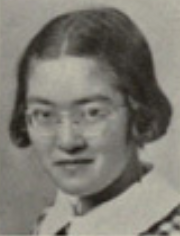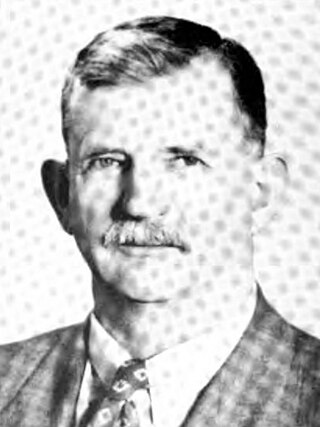Related Research Articles

Edward Geary Lansdale was a United States Air Force officer until retiring in 1963 as a major general before continuing his work with the Central Intelligence Agency (CIA). Lansdale was a pioneer in clandestine operations and psychological warfare. In the early 1950s, Lansdale played a significant role in suppressing the Hukbalahap Rebellion in the Philippines. In 1954, he moved to Saigon and started the Saigon Military Mission, a covert intelligence operation which was created to sow dissension in North Vietnam. Lansdale believed the United States could win guerrilla wars by studying the enemy's psychology, an approach that won the approval of the presidential administrations of both Kennedy and Johnson.
A teach-in is similar to a general educational forum on any complicated issue, usually an issue involving current political affairs. The main difference between a teach-in and a seminar is the refusal to limit the discussion to a specific time frame or a strict academic scope. Teach-ins are meant to be practical, participatory, and oriented toward action. While they include experts lecturing on their area of expertise, discussion and questions from the audience are welcome, even mid-lecture. "Teach-ins" were popularized during the U.S. government's involvement in Vietnam. The first teach-in, which was held overnight at the University of Michigan in March 1965, began with a discussion of the Vietnam War draft and ended in the early morning with a speech by philosopher Arnold Kaufman.

Opposition to United States involvement in the Vietnam War (before) or anti-Vietnam War movement (present) began with demonstrations in 1965 against the escalating role of the United States in the Vietnam War and grew into a broad social movement over the ensuing several years. This movement informed and helped shape the vigorous and polarizing debate, primarily in the United States, during the second half of the 1960s and early 1970s on how to end the Vietnam War.

"Make love, not war" is an anti-war slogan commonly associated with the American counterculture of the 1960s. It was used primarily by those who were opposed to the Vietnam War, but has been invoked in other anti-war contexts since, around the world. The "Make love" part of the slogan often referred to the practice of free love that was growing among the American youth who denounced marriage as a tool for those who supported war and favored the traditional capitalist culture.

Women Strike for Peace was a women's peace activist group in the United States. In 1961, nearing the height of the Cold War, around 50,000 women marched in 60 cities around the United States to demonstrate against the testing of nuclear weapons. It was the largest national women's peace protest during the 20th century. Another group action was led by Dagmar Wilson, with about 1,500 women gathering at the foot of the Washington Monument while President John F. Kennedy watched from the White House. The protest helped "push the United States and the Soviet Union into signing a nuclear test-ban treaty two years later". Reflecting the era in which the group's leaders had been raised, between the First-wave feminism and the Second-wave feminism movements, their actions and pleas leaned towards female self-sacrifice rather than towards their own self-interests. However, they pushed the power of a concerned mother to the forefront of American politics, transforming the mother from a "passive victim of war to active fighter for peace".

Paul Schuster Taylor was an American progressive agricultural economist. He was an undergraduate at the University of Wisconsin and earned his PhD at the University of California, Berkeley where he then became professor of economics from 1922, until his retirement in 1962.

Frances Crowe was an American peace activist and pacifist from the Pioneer Valley of Western Massachusetts.

Marii Hasegawa, born Kyogoku Marii, was a peace activist, known for her fifty years of work with the Women's International League for Peace and Freedom, including serving as its president during the Vietnam War.
Norma Alarcón is a Chicana author and publisher in the United States. She is the founder of Third Woman Press and a major figure in Chicana feminism. She is Professor Emerita of Chicano/Latino Studies at the University of California, Berkeley.

The role of women in Vietnam was subject to many changes throughout the history of Vietnam. They have taken on varying roles in society, including warriors, nurses, mothers and wives. There have been many advances in women's rights in Vietnam, such as an increase in women representation in government, as well as the creation of the Vietnam Women's Union in 1930.

Lilian "Lillie" Belle Bridgman (1866–1948) was an American architect, educator, writer, and scientist. After working first as a science teacher and writer, she changed her profession in mid-life and followed her dream of becoming an architect.

Nelson S. Dilworth was an American farmer who served for 24 years in the California legislature. Dilworth was a strong proponent of restrictions on communists in schools and state government jobs.
Anne McGrew Bennett was an American writer and feminist. She was the first woman invited to give a commencement address at the Union Theological Seminary/

Women in the Vietnam War were active in a large variety of roles, making significant impacts on the War and with the War having significant impacts on them.
Julia Cooley Altrocchi was an American author and poet, who wrote many works for children and adults, including The Poems of a Child, The Dance of Youth, Snow Covered Wagons, and Wolves Against the Moon.
Alice Mary Hilton was a British-American academic and author. She coined the term cyberculture in 1963. She served as president of The Institute for Cybercultural Research, which she founded, and of the Society for Social Responsibility in Science.

Phyllis "Pele" Murdock de Lappe (1916–2007) was an American artist, known for her social realist paintings, prints, and drawings. She also worked as a journalist, newspaper editor, illustrator, and political cartoonist. de Lappe had been a resident for many years in Berkeley, California and later, Petaluma, California.

The Fannie Jackson Coppin Club, also known as the Fanny Jackson Coppin Club, was a club for politically active African American women located in Alameda County, California. The club played an important role in community outreach to voters before and after the passage of Proposition 4 in 1911 which granted women in California the right to vote. Many of the women involved in the club were active in the California suffrage movement.
References
- ↑ Frazier, Jessica M. (2012-07-01). "Collaborative Efforts to End the War in Viet Nam: The Interactions of Women Strike for Peace, the Vietnamese Women's Union, and the Women's Union of Liberation, 1965–1968". Peace & Change. 37 (3): 339–365. doi:10.1111/j.1468-0130.2012.00754.x. ISSN 1468-0130.
- ↑ Herring, Frances W (1947). Public works aspects of the housing problem. Chicago. OCLC 23945623.
{{cite book}}: CS1 maint: location missing publisher (link) - ↑ Washington State Planning Council; Herring, Frances W; Snohomish County Public Utility District No. 1 (Wash.) (1944). Minerals and mining opportunities in Snohomish County. Place of publication not identified. OCLC 18356607.
{{cite book}}: CS1 maint: location missing publisher (link) - ↑ Casey, Conor. "Library Guides: Labor Archives of Washington: Pro-Labor Organizations". guides.lib.uw.edu. Retrieved 2019-02-24.
- ↑ University of California, Berkeley.; Herring, Frances W.; California. (1959). Development and control of nuclear industry in California. Assembly interim committee reports, 1957-1959 ;v. 9, no. 15. Sacramento: Assembly of the State of California.
- ↑ "Guide to the Women's International League for Peace and Freedom Collection ARS.0056". oac.cdlib.org. Retrieved 2019-02-24.
- ↑ "Guide to the San Francisco Women for Peace Records, 1943-[on-going]". oac.cdlib.org. Retrieved 2019-02-24.
- ↑ "Welcome to Imperial College London | Kanopy". imperial.kanopy.com. Retrieved 2019-02-24.
- ↑ Swerdlow, Amy (1993-11-15). Women Strike for Peace: Traditional Motherhood and Radical Politics in the 1960s. University of Chicago Press. ISBN 9780226786360.
- ↑ Hershberger, Mary (1998). Traveling to Vietnam: American Peace Activists and the War. Syracuse University Press. ISBN 9780815605171.
- ↑ "Nancy Mamis". The History of Women Strike for Peace. 2017-09-26. Retrieved 2019-02-24.
- ↑ Hershberger, Mary (1998). Traveling to Vietnam: American Peace Activists and the War. Syracuse University Press. ISBN 9780815605171.
- ↑ Frazier, Jessica M. (2012-07-01). "Collaborative Efforts to End the War in Viet Nam: The Interactions of Women Strike for Peace, the Vietnamese Women's Union, and the Women's Union of Liberation, 1965–1968". Peace & Change. 37 (3): 339–365. doi:10.1111/j.1468-0130.2012.00754.x. ISSN 1468-0130.
- ↑ "Guaranteed Income Asked For All, Employed or Not". The New York Times. 1964-03-23. ISSN 0362-4331 . Retrieved 2019-02-24.
- ↑ Labor, United States Congress House Committee on Education and (1964). National Commission on Technology, Automation, and Economic Progress: Hearings Before the Select Subcommittee on Labor, of the Committee on Education and Labor, House of Representatives, Eighty-eighth Congress, Second Session, on H.R. 10310, and Related Bills to Establish a National Commission on Automation and Technological Progress. Hearings Held in Washington, D.C., April 14, 15, and 27, 1964. U.S. Government Printing Office.
- ↑ "Frances W Herring in Social Security Death Index". Fold3. Retrieved 2019-02-24.
- ↑ Open Space and the Law. Institute of Governmental Studies. January 1965. Retrieved 2019-02-24– via www.amazon.com.